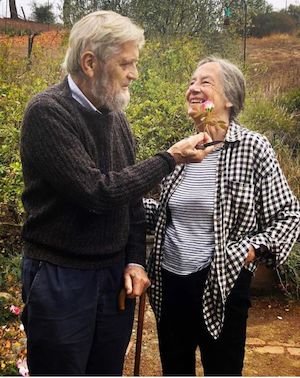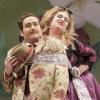
Charles Shere, born in Berkeley, California, in 1935, died in his home in Healdsburg on Dec. 15. A prominent figure on the Bay Area music scene for decades, Shere was a composer, music director of KPFA in the 1960s, a producer at KQED-TV, music and art critic of the Oakland Tribune (1971-1988), and on the faculty of Mills College (1971–1986). (Listen to his 1967 KPFA interview with Morton Feldman here.)

His wife for 64 years, Lindsey Shere, author and pastry chef, released a note he wrote after a stroke, which left him partially paralyzed two months ago:
Death is the bend in the road; dying is only not being visible. It may be two weeks before I go around that bend, it may be a few months. I hope I get there before any of you. And if you look carefully you may see me with my stick trudging happily along in countryside more tranquil than what we’re in here. You are my family but I love you anyway! Very much!
I have no complaints. I’ve had 85 years full of music, art, books, travel, and most of all many dear and loyal friends. My life has touched others, I know, and I have been made a better man by these friendships. My life is full of love.”
While mostly self-taught, Shere studied composition briefly with Robert Erickson and Luciano Berio. His music was primarily in unconventional notations and open form through the early 1980s, but turned to more conventional forms later.
His compositions have been described by John Adams, a Berkeley neighbor, writing in The New Grove Dictionary of American Music:
Shere’s music is rooted in the experimentalism of the 1960s and owes something to Cage and Stockhausen in its technical procedures. But the principal creative model for him is Duchamp, whose perceptual conundrums and whimsical arcana are reflected in many of Shere’s scores, especially his ‘Duchamp opera,’ The Bride Stripped Bare by Her Bachelors, Even. Tongues (1978), an extended essay in glossolalia for chamber ensemble and speaker/singer, typifies his deft blend of wit, lyricism, and complex verbal and musical symbolism.”
Besides The Bride, Shere’s major works include Symphony in Three Movements (1989), concerti for piano and for violin (1964; 1989), a number of songs, the piano sonatas Bachelor machine (1985) and Compositio ut explicatio (2006), and various pieces for chamber ensembles.
His books include Thinking Sound Music: The Life and Work of Robert Erickson; Why I Read Stein; How I Saw Duchamp; and (as co-editor with Virgil Thompson and Margery Tede) Everbest Ever: Correspondence With Bay Area Friends. Shere was the recipient of two fellowships from the National Endowment for the Arts (as an art critic and an opera composer).
Through the decades, I have never forgotten a review Shere wrote in the Oakland Tribune in 1972, in which he discovered and documented a teenage artist who evolved from youth orchestra violist into a mezzo-soprano who would go on to international fame (as Lorraine, not Lorrie):
The Oakland Youth Orchestra [under the baton of Denis deCoteau, long-time music director of the San Francisco Ballet] showed its stuff last night in an almost frightening display of competence and musicianship. At many points along the tiring two-hour-plus concert the sound was thoroughly professional.
After Miss Jacob took her place next to the principal cellist, the assistant principal violist, Lorrie Hunt, came forward to sing “My Heart at Thy Sweet Voice,” from Saint-Saens’s Samson and Delilah. It’s not fanciful to suggest an affinity between her instrument and her voice, which is sweet, honey-dark and full, and seems to be produced with great ease.
She simply stood there and sang, hardly even opening her mouth, with an even range, secure high notes, and marvelous control of dynamics in the swells, before the famous descending line of the aria. There was even some smolder to this 16-year-old’s delivery of the seductress’ aria."
Shere’s Nightmusic (1971) was premiered in 1982 by the Oakland Symphony Youth Orchestra, conducted by Kent Nagano and subsequently issued on an LP from 1750 Arch Records.




